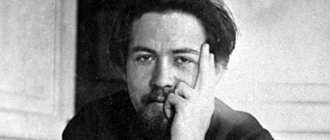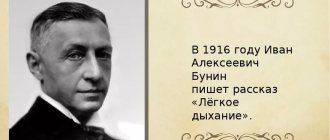Many of the creations of A.P. Chekhov, who has an extraordinary talent for revealing many pressing social and philosophical problems in his small works, surprise with their insight and realism. This is also the story “Ward No. 6”. In this work we see a story that can touch the strings of a person’s soul. The author of the story conveyed in it his thoughts on various social and moral topics. The multi-wise Litrekon offers a detailed analysis of “Ward No. 6”, which will help you fully understand the essence and meaning of the work.
History of creation
The story “Ward No. 6” was the result of A.P. Chekhov’s protest against the miserable way of life of mentally ill people in Russia. In 1887, the writer became acquainted with the “Report on the inspection of Russian psychiatric institutions” by the doctor A.P. Arkhangelsky. He was of great interest in the last part of the document, which spoke about the conditions of detention of the mentally ill, who are calmed down through beatings, and the hospitals themselves are described as more like prisons. In 1890, Chekhov went to Sakhalin Island. On this “convict island” the writer saw with his own eyes all the horror of life of convicts and exiles, witnessed the disgusting attitude of the guards towards prisoners, felt all the heavy, stuffy and gloomy atmosphere of such places. The impressions of what was learned and seen were reflected in “Ward No. 6”.
A.P. Chekhov first mentioned the story in correspondence with journalist and publisher A.S. Suvorin in March 1892. In the letter, he talks a little about the work he began, says that it is dominated by reasoning and there is no love line, and also notes that the direction of the story is liberal. Chekhov finished writing “Ward No. 6” in May 1892. And the work was first published in the November issue of the magazine “Russian Thought” of the same year.
Genre, direction
“Ward No. 6” is written in the genre of a story, which, as a rule, is larger in volume than a short story, but does not reach the level of a full-fledged novel. The story is characterized by a topical plot that unfolds around one main character, the main meaning, which is revealed only at the end of the work, as well as the described events taking place in modern times for the author. We can see all this in “Ward No. 6”.
The story is written in the direction of realism, which was popular in Russian literature at the turn of two centuries. The work has many features of this direction: an objective depiction of life and everyday life, pronounced social problems, typical characters, circumstances, situations, conflicts and language close to living speech.
The gist: what is the story about?
The main character of the work is Doctor Andrei Efimych Ragin. He is a well-mannered, educated, kind-hearted person, but, unfortunately, weak-willed. He is aware that the place where he works is in such a deplorable state that it is difficult to even call it a hospital, but he does not see the slightest point in making any attempts to correct or improve the situation. At first he tried to treat patients, but over time he comes to the conclusion that this is of little use, because all people ultimately face the same end - death.
Next to the hospital there is a neglected outbuilding in which ward number 6 is located. It contains the mentally ill, about whom few people care. One day Ragin looked into the outbuilding and started a conversation with one of the patients - Ivan Dmitrievich Gromov - a young educated nobleman with a persecution mania. The discussion with the patient interested the doctor so much that he began to constantly visit the outbuilding. Of course, this fact was not ignored by the hospital staff; people began to spread gossip about Ragin’s strange friendship with the patient of ward No. 6.
Suddenly Andrei Efimych is summoned by the city mayor. The hero later understands that this was a kind of test of his adequacy. A week after that, the doctor was gently hinted that he would have to leave his post of his own free will. The hero leaves with his friend, postmaster Mikhail Averyanovich, on a short trip, upon his return from which he learns that his position as chief physician is now occupied by the young paramedic Khobotov, and he urgently needs to move out of the hospital apartment. The postmaster on the trip knew he had a large sum, but never gave it back, so all of Ragin’s savings went to waste.
Now he constantly sits at home, for which he pays his last pennies and even gets into debt. Every day he is visited by Mikhail Averyanych and Khobotov, who soon tire of him, and he kicks them out with a scream. After this incident, Khobotov cunningly lures Ragin into ward No. 6 and leaves him there for treatment. The watchman Nikita severely beats his former boss that evening. After lying in ward No. 6 for only one day, the hero dies of a stroke.
Aphorisms and quotes from books by Russian authors -Baratynsky E. * Batyushkov K. * Berggolts O. * Berdyaev N. * Blok A. * Bulgakov M. * Bunin I. * Bykov V. * Vyazemsky P. * Herzen A. * Gogol N. * Goncharov I. * Gorky M * Griboyedov A. * Green A. * Dobrolyubov N. * Dostoevsky F. * Yesenin S. * Ilf I. * Karamzin N. * Kataev V. * Kolchak A. * Krylov I. * Lermontov M. * Leskov N. - new author, quotes * Likhachev D. * Lomonosov M. * Mayakovsky V. * Nabokov V. * Nekrasov N. * Ostrovsky A. * Petrov E. * Prishvin M. * Pushkin A. - new quotes * Radishchev A. * Roerich N * Saltykov-Shchedrin M. * Simonov K. * Stanislavsky K. * Stanyukovich K. * Stolypin P. * Sumarokov A. * Tolstoy A.K. * Tolstoy A.N. * Tolstoy L.N. * Turgenev I. * Tyutchev F. * Fonvizin D. * Chekhov A. * Schwartz E. * Eisenstein S. * Ehrenburg I.
Russia, end of XX - beginning of XXI
— Akunin B. * Altov S. * Vysotsky V. * Geraskina L. * Dementiev A. * Zadornov M. * Kunin V. * Melikhan K. * Okudzhava B. * Rozhdestvensky R. * Sakharov A. * Snegov S. * Solzhenitsyn A. * Suvorov V. * Talkov I. * Troepolsky G. * Uspensky E. * Filatov L. * Chernykh V. * Shenderovich V. * Shcherbakova G.
Chekhov Anton Pavlovich (1860 - 1904)
Quotes
- sheet
1 () () () () () () Biography >>
Quotes from the story by A.P. Chekhov “Ward number 6”, 1892
People who have a professional, business-like attitude towards the suffering of others, for example judges, police officers, doctors, over time, by force of habit, are tempered to such an extent that they would like, but cannot, treat their clients otherwise than formally; in this regard, they are no different from the peasant who slaughters sheep and calves in the backyard and does not notice the blood. - (Ivan Dmitrich)
With a formal, soulless attitude towards the individual, in order to deprive an innocent person of all the rights of his fortune and sentence him to hard labor, the judge needs only one thing: time. Only time to comply with some formalities for which the judge is paid a salary. - (Ivan Dmitrich)
There is no crime worse than the murder of the weak and defenseless. - (Ivan Dmitrich)
Isn’t it funny to think about justice when all violence is met by society as a reasonable and expedient necessity, and every act of mercy, for example an acquittal, causes a whole explosion of dissatisfied, vengeful feelings? - (Ivan Dmitrich)
You shouldn't stop people from going crazy. - (Dr. Andrey Efimych)
If physical and moral uncleanness is driven away from one place, it will move to another; you have to wait for it to disappear on its own. - (Dr. Andrey Efimych)
There is nothing so good on earth that in its original source it would not have filth. - (Dr. Andrey Efimych)
It is not physically possible to provide serious assistance to forty incoming patients from morning to lunch, which means that inevitably it is just a deception. In the reporting year, twelve thousand incoming patients were admitted, which means, simply speaking, twelve thousand people were deceived. - (Dr. Andrey Efimych)
It is also impossible to put serious patients in wards and deal with them according to the rules of science, because there are rules, but there is no science; If you leave behind philosophy and pedantically follow the rules, like other doctors, then first of all you need cleanliness and ventilation, not dirt, healthy food, not stinking sauerkraut soup, and good helpers, not thieves. - (Dr. Andrey Efimych)
Why stop people from dying if death is the normal and legitimate end of everyone? What does it matter if some tradesman or official lives an extra five or ten years? - (Dr. Andrey Efimych)
Pushkin experienced terrible torment before his death, poor Heine lay paralyzed for several years; Why shouldn’t some Andrei Yefimych or Matryona Savishna get sick, whose life is meaningless and would be completely empty and similar to the life of an amoeba if not for suffering? - (Dr. Andrey Efimych)
The mind draws a sharp line between animal and man, hints at the divinity of the latter and, to some extent, even replaces immortality for him, which does not exist. Based on this, the mind serves as the only possible source of pleasure. - (Dr. Andrey Efimych)
The main characters and their characteristics
The main character of the work is rightfully the chief physician Ragin, but his “bosom friend,” the sick Gromov, also plays a significant role in the story.
| heroes of "ward number 6" | characteristic |
| Andrey Efimovich Ragin | doctor at a provincial city hospital. I went into medicine not by choice, but at the insistence of my father. he himself, according to rumors, wanted to enter the theological academy and become a priest. a delicate, honest, prudent, sensible and well-mannered person. Although his appearance is “heavy, rough, peasant,” he himself is very shy, quiet and modest. His disposition is too meek and soft, “he positively does not know how to order, prohibit and insist.” Due to his weak character and indecisiveness, he does not make a good hospital manager. he sees no point in renovating the premises, buying new equipment, firing incompetent staff, since this will not cause fewer people to die in this seedy place. his day is very boring and dull: in the morning he sees several patients, then goes home, where he reads, drinks beer and tea, sometimes Mikhail Averyanych visits him, with whom they either smoke silently or philosophize. the hero feels very lonely. he is of the opinion that in the small provincial town there is not a single person who is distinguished by his intelligence, conversations with whom could be captivating and interesting, not taking into account first his friend, the postmaster, and later Ivan Dmitrievich Gromov. |
| Ivan Dmitrievich Gromov | a mentally ill patient in Ward No. 6 suffering from persecutory delusions. he is approximately 33 years old, a nobleman by birth. about 15 years ago a series of sorrows and failures began in his life. First, his very young brother died, and a week later his father was arrested, who died in a prison hospital from typhus. After this, Ivan Dmitrievich and his mother were left without a home and property. he began to earn extra money as a teacher for a pittance; after the death of his mother, he first loitered around for some time out of grief, living on nothing but water and bread, and then received the position of bailiff. All these misfortunes that befell were the cause of the ensuing disorder. From his youth the hero was very frail and sickly. he is educated, studied at St. Petersburg University, but was unable to complete his studies due to family circumstances. he is very well read, but due to illness he has lost all interest in books. Gromov is very well-mannered, intelligent, thoughtful and sincere. but at the same time he is suspicious, timid and unrestrained, it is difficult for him to establish any relationships with people, which is why he has no friends. despises the people living in the city, “their gross ignorance and sleepy animal life seem vile and disgusting to him.” |
| Mikhail Averyanovich | postmaster, Andrei Yefimych's only friend in the city. a bankrupt wealthy landowner. His character is complex, he is “kind and sensitive, but quick-tempered.” because of this, post office visitors are afraid to go there. According to Ragin, he is the only person in the city with whom you can maintain a fascinating conversation. While relaxing with the doctor, the postmaster only drinks, overeats and plays cards for money, successfully loses it, and borrows new money from his friend, which he also squanders and does not give back. |
| Evgeny Fedorovich Khobotov | a young doctor sent to help Andrei Yefimych. he is absolutely indifferent and cynical towards the sick. his work at the hospital brings absolutely no benefit. arrogant, swaggering and two-faced, he tries to trick Ragin with cunning, which he successfully manages to do. |
| Nikita | guard at the hospital. an old retired soldier, his appearance is menacing and intimidating. stupid and soulless, he believes that for the sake of order in the hospital, patients must be beaten. mocks the mentally ill, to whom he is assigned as a guard, beats and robs them without a trace of conscience, and does not bear any responsibility for this, therefore he feels very free in his horrific actions. |
Ward No. 6 (Chekhov A.P., 1892)
IX
One spring evening, at the end of March, when there was no longer snow on the ground and starlings were singing in the hospital garden, the doctor went out to accompany his friend the postmaster to the gate. Just at this time, the Jew Moiseika, returning from mining, entered the courtyard. He was without a hat and wearing small galoshes on his bare feet and was holding a small bag of alms in his hands.
- Give me a penny! - he turned to the doctor, shivering from the cold and smiling.
Andrei Yefimitch, who never knew how to refuse, gave him a ten-kopeck piece.
“How bad this is,” he thought, looking at his bare feet with red skinny ankles. “It’s wet.”
And, prompted by a feeling similar to pity and disgust, he followed the Jew into the outbuilding, looking first at his bald head, then at his ankles. When the doctor entered, Nikita jumped up from the pile of rubbish and stretched out.
“Hello, Nikita,” Andrei Yefimitch said softly. “How can we give this Jew boots, or else he’ll catch a cold?”
- I’m listening, your honor. I'll report to the caretaker.
- Please. You ask him on my behalf. Say what I asked.
The door from the hallway to the ward was open. Ivan Dmitrich, lying on the bed and raising himself on his elbow, listened with alarm to someone else's voice and suddenly recognized the doctor. He shook all over with anger, jumped up and, with a red, angry face, and bulging eyes, ran out into the middle of the room.
- The doctor has come! - he shouted and laughed. - Finally! Gentlemen, congratulations, the doctor honors us with his visit! Damn bastard! - he squealed and in a frenzy such as had never been seen in the ward, he stamped his foot. - Kill this reptile! No, it’s not enough to kill! Drown in a latrine!
Andrei Yefimitch, who heard this, looked out of the hallway into the room and asked softly:
- For what?
- For what? - Ivan Dmitrich shouted, approaching him with a threatening look and frantically wrapping himself in his robe. - For what? Thief! - he said with disgust and making his lips as if he wanted to spit. - Charlatan! Executioner!
“Calm down,” said Andrei Yefimitch, smiling guiltily. “I assure you, I never stole anything, but otherwise, you are probably greatly exaggerating.” I see that you are angry with me. Calm down, I beg you, if you can, and say calmly: why are you angry?
- Why are you keeping me here?
- Because you are sick.
- Yes, I’m sick. But there are dozens, hundreds of crazy people walking free, because your ignorance is not able to distinguish them from the healthy. Why should I and these unfortunate people sit here for everyone, like scapegoats? You, the paramedic, the caretaker and all your hospital bastard are morally immeasurably lower than each of us, why are we in prison and you are not? Where is the logic?
— Moral attitude and logic have nothing to do with it. It all depends on the case. The one who was imprisoned sits, and the one who was not imprisoned walks, that’s all. There is no morality or logic in the fact that I am a doctor and you are mentally ill, but only an empty accident.
“I don’t understand this nonsense...” Ivan Dmitrich said stupidly and sat down on his bed.
Moiseika, whom Nikita was embarrassed to search in the presence of the doctor, laid out pieces of bread, pieces of paper and bones on his bed and, still shivering from the cold, began to speak quickly and melodiously in Hebrew. He probably imagined that he had opened a shop.
“Let me go,” said Ivan Dmitrich, and his voice trembled.
- I can not.
- But why? Why?
- Because it is not in my power. Judge, what good will it do you if I let you go? Go. You will be detained by townspeople or the police and returned back.
“Yes, yes, it’s true...” said Ivan Dmitrich and rubbed his forehead. - It's horrible! But what should I do? What?
Andrei Efimych liked Ivan Dmitrich's voice and his young, intelligent face with grimaces. He wanted to caress the young man and calm him down. He sat down next to him on the bed, thought and said:
-Are you asking what to do? The best thing in your situation is to run away from here. But, unfortunately, this is useless. You will be detained. When society protects itself from criminals, mentally ill people and generally inconvenient people, then it is invincible. You have only one thing left to do: calm down in the thought that your stay here is necessary.
- Nobody needs it.
- Since there are prisons and insane asylums, then someone must be in them. If it’s not you, it’s me; if it’s not me, it’s someone else. Wait, when in the distant future the prisons and insane asylums cease to exist, there will be neither bars on the windows nor dressing gowns. Of course, such a time will come sooner or later.
Ivan Dmitrich smiled mockingly.
“You’re kidding,” he said, narrowing his eyes. “Such gentlemen as you and your assistant Nikita do not care about the future, but you can be sure, dear sir, better times will come!” Let me express myself vulgarly, laugh, but the dawn of a new life will shine, truth will triumph, and - there will be a holiday on our street! I can’t wait, I’ll die, but someone’s great-grandchildren will. I greet them with all my heart and rejoice, rejoice for them! Forward! God help you, friends!
Ivan Dmitrich stood up with sparkling eyes and, stretching out his hands to the window, continued with excitement in his voice:
- Because of these bars, I bless you! Long live the truth! I'm happy!
“I don’t find any particular reason to rejoice,” said Andrei Yefimitch, to whom Ivan Dmitrich’s movement seemed theatrical and at the same time very pleasant. “There will be no prisons or insane asylums, and the truth, as you deigned to put it, will triumph, but the essence of things will not change, the laws of nature will remain the same.” People will get sick, grow old and die just like now. No matter how magnificent the dawn illuminates your life, in the end you will be nailed into a coffin and thrown into a pit.
- What about immortality?
- Oh, come on!
- You don’t believe it, but I believe it. In Dostoevsky or Voltaire, someone says that if there were no God, then people would have invented him. And I deeply believe that if there is no immortality, then sooner or later a great human mind will invent it.
“Well said,” said Andrei Yefimitch, smiling with pleasure. - It's good that you believe. With such faith one can live happily even if one is walled up in the wall. Would you like to get an education somewhere?
- Yes, I was at the university, but I didn’t graduate.
— You are a thinking and thoughtful person. In any situation, you can find peace in yourself. Free and deep thinking, which strives to understand life, and complete contempt for the stupid vanity of the world - these are two blessings, greater than which man has never known. And you can have them, even if you live behind three bars. Diogenes lived in a barrel, but was happier than all the kings of the earth.
“Your Diogenes was a fool,” said Ivan Dmitrich gloomily. “What are you telling me about Diogenes and some kind of understanding?” - He suddenly got angry and jumped up. - I love life, I love it passionately! I have a persecution mania, a constant painful fear, but there are moments when I am overcome by a thirst for life, and then I am afraid of going crazy. I want to live terribly, terribly!
He walked around the room in excitement and said, lowering his voice:
— When I dream, ghosts visit me. Some people come to me, I hear voices, music, and it seems to me that I am walking through some forests, along the seashore, and I so passionately want bustle, care... Tell me, what’s new there? - asked Ivan Dmitrich. - What's there?
— Do you want to know about the city or in general?
- Well, first tell me about the city, and then in general.
- Well? It’s painfully boring in the city... There’s no one to say a word to, no one to listen to. There are no new people. However, a young doctor, Khobotov, recently arrived.
- He arrived with me. What, boor?
- Yes, an uncultured person. It’s strange, you know... Apparently, in our capitals there is no mental stagnation, there is movement, which means there must be real people there, but for some reason every time they send people from there to us that I wouldn’t even look at. Unhappy city!
- Yes, unfortunate city! - Ivan Dmitrich sighed and laughed. - How in general? What do they write in newspapers and magazines?
It was already dark in the room. The doctor stood up and, standing, began to tell what was being written abroad and in Russia and what direction of thought was now being noticed. Ivan Dmitrich listened attentively and asked questions, but suddenly, as if remembering something terrible, he grabbed his head and lay down on the bed with his back to the doctor.
- What's wrong with you? - asked Andrei Yefimitch.
“You won’t hear a single word from me again!” - Ivan Dmitrich said rudely. - Leave me!
- From what?
- I tell you: leave it! What the hell?
Andrei Yefimitch shrugged his shoulders, sighed and left. Passing through the entryway, he said:
- How can I clean this place, Nikita... It’s a terribly heavy smell!
- I’m listening, your honor!
“What a nice young man! - thought Andrei Yefimitch, walking to his apartment. “In all the time I’ve been living here, this seems to be the first one I can talk to.” He knows how to reason and is interested in exactly what is needed.”
While reading and then going to bed, he kept thinking about Ivan Dmitrich, and when he woke up the next morning, he remembered that yesterday he had met an intelligent and interesting person, and decided to go see him again at the first opportunity.
Topics and issues
The themes and issues of “Ward No. 6” are very unique:
- Perhaps the main theme of the story is the theme of spiritual poverty
. The entire provincial city is completely mired in philistinism and philistinism. Its inhabitants see no meaning in literally anything, live every day exactly the same as the previous one, do not develop either intellectually or spiritually. Spreading gossip and whispering behind one's back is the only entertainment they know. This entire small, dim and boring town with its ignorant and trivial inhabitants is a kind of cocoon in which outdated values and practices rule. The main character himself says: “...in our city there are absolutely no people who know how and love to have an intelligent and interesting conversation.” How bad things are in this place becomes clear when the only interesting interlocutor for the doctor becomes a mentally ill person. - Another theme smoothly follows from this topic, namely the topic of loneliness
. Both Andrei Efimych and Ivan Dmitrievich were lonely. They simply had no one to share their thoughts and feelings with; all the inhabitants of the city were alien and boring to them, so they became close to each other for a while. Most likely, it was loneliness, isolation and unsociability that brought these heroes to ward No. 6. - Far from central, but quite significant is the theme of life's calling
. Dr. Ragin went into medicine not at all out of a desire to help people, but at the insistence of his father. The hero himself dreamed of becoming a priest and devoting his life to religion. But becoming a doctor because of the pressure of his parents, Andrei Efimych did not bring any benefit either to himself or to the patients who were “lucky” to be treated by him. This made the hero’s life even more aimless, futile and sad. - In addition, “Ward No. 6” reveals many important problems. At the very beginning of the work, we are immediately confronted with the social problem of irresponsibility and injustice
. We see a neglected outbuilding and a hospital, doctors, paramedics and nurses who do not care about their work. Officials spend money on “unnecessary buildings and unnecessary positions,” although they could “maintain two exemplary hospitals” with these funds. But they are indifferent to the problems of poor people who are forced to be treated in this terrible institution, for some reason called a hospital. - Another problem that intersects with the above problem is the problem of indifference
. As has already been said, the medical staff doesn’t give a damn about the patients, the watchman Nikita doesn’t give a damn about the patients of ward No. 6, Mikhail Averyanych doesn’t give a damn about his seemingly friend Andrei Efimych, and the main character himself doesn’t give a damn about the hospital, the patients, and his life in general. The city is ruled by general indifference. No one cares about anyone else, no one will come to the aid of another, and it is precisely this attitude of people that destroys the hero of the work. - A rather important problem
is revealed in the debate between Ragin and Gromov about
the essence of suffering
. The doctor believes that “a thinking, thoughtful person... despises suffering”; it is alien to him. Ivan Dmitrievich is of the opinion that only a truly living person is capable of suffering, and one who does not experience any feelings is a lost person. Speaking about this, he points to one of the inhabitants of the outbuilding - swollen with fat, not reacting to anything, even to beatings from the guard, a man. Gromov also claims that the doctor never suffered in his life, which is why he philosophizes. Andrei Efimych fully begins to understand Ivan Dmitrievich only when he himself turns out to be a patient in ward No. 6. On the very first evening he was beaten by Nikita, it was then that for the first time the doctor understood what real suffering was, the thought slipped through his mind “... that the same pain must have been experienced for years, day after day, by these people, who now seemed like black shadows in the moonlight … He didn’t know, had no idea about pain...”
Ward number 6 - Quotes
Quotes from the story “Ward No. 6”, 1892 (author Anton Pavlovich Chekhov)
People who have a professional, business-like attitude towards the suffering of others, for example judges, police officers, doctors, over time, by force of habit, are tempered to such an extent that they would like, but cannot, treat their clients otherwise than formally; in this regard, they are no different from the peasant who slaughters sheep and calves in the backyard and does not notice the blood. (Ivan Dmitrich) With a formal, soulless attitude towards the individual, in order to deprive an innocent person of all the rights of his fortune and sentence him to hard labor, the judge needs only one thing: time. Only time to comply with some formalities for which the judge is paid a salary. (Ivan Dmitrich) There is no more vile crime than the murder of the weak and defenseless. (Ivan Dmitrich) Isn’t it funny to think about justice when all violence is met by society as a reasonable and expedient necessity, and every act of mercy, for example an acquittal, causes a whole explosion of dissatisfied, vengeful feelings? (Ivan Dmitrich) You shouldn't stop people from going crazy. (Dr. Andrei Efimich) If physical and moral impurity is driven away from one place, then it will move to another; you have to wait for it to disappear on its own. (Dr. Andrei Efimich) There is nothing so good on earth that in its original source it would not have filth. (Dr. Andrei Efimych) It is not physically possible to provide serious assistance to forty incoming patients from morning to lunch, which means that inevitably it is just a deception. In the reporting year, twelve thousand incoming patients were admitted, which means, simply speaking, twelve thousand people were deceived. (Dr. Andrei Efimych) It is also impossible to put serious patients in wards and deal with them according to the rules of science, because there are rules, but there is no science; If you leave behind philosophy and pedantically follow the rules, like other doctors, then first of all you need cleanliness and ventilation, not dirt, healthy food, not stinking sauerkraut soup, and good helpers, not thieves. (Dr. Andrei Efimych) Why stop people from dying if death is the normal and legitimate end of everyone? What does it matter if some tradesman or official lives an extra five or ten years? (Dr. Andrei Efimych) Pushkin experienced terrible torment before his death, poor Heine lay paralyzed for several years; Why shouldn’t some Andrei Yefimych or Matryona Savishna get sick, whose life is meaningless and would be completely empty and similar to the life of an amoeba if not for suffering? (Dr. Andrei Efimych) The mind draws a sharp line between animal and man, hints at the divinity of the latter and, to some extent, even replaces immortality for him, which does not exist. Based on this, the mind serves as the only possible source of pleasure. (Dr. Andrei Efimych) Books are notes, and conversation is singing. (Dr. Andrei Efimych) Life is an annoying trap. When a thinking person reaches manhood and comes into mature consciousness, he involuntarily feels as if he is in a trap from which there is no way out. (Dr. Andrey Efimych) In the reporting year, twelve thousand people were deceived; the entire hospital business, like twenty years ago, is built on theft, squabbles, gossip, nepotism, and gross quackery, and the hospital is still an immoral institution and extremely harmful to the health of its residents. (Dr. Andrei Efimich) I serve a harmful cause and receive a salary from the people I deceive; I'm not honest. But in myself I am nothing, I am only a particle of a necessary social evil: all the district officials are harmful and receive their salaries for nothing... This means that it is not I who are to blame for my dishonesty, but time... If I had been born two hundred years later, I would have been different... (Dr. Andrei Efimych) Dozens, hundreds of crazy people walk free, because your ignorance is not able to distinguish them from the healthy. Why should I and these unfortunate people sit here for everyone, like scapegoats? (Ivan Dmitrich) It all depends on the case. The one who was imprisoned sits, and the one who was not imprisoned walks, that’s all. There is no morality or logic in the fact that I am a doctor and you are mentally ill, but only an empty accident. (Dr. Andrei Efimych) When society protects itself from criminals, mentally ill people and generally inconvenient people, then it is invincible. (Dr. Andrei Efimych) Since there are prisons and insane asylums, then someone must be in them. If it’s not you, it’s me; if it’s not me, it’s someone else. (Dr. Andrei Efimych) Gentlemen like you and your assistant Nikita don’t care about the future, but you can be sure, dear sir, better times will come! Let me express myself vulgarly, laugh, but the dawn of a new life will shine, truth will triumph, and - there will be a holiday on our street! (Ivan Dmitrich) A person’s peace and contentment is not outside of him, but within himself. (Dr. Andrei Efimich) Diogenes did not need an office or a warm room; It's already hot there. Lie in a barrel and eat oranges and olives. And if he happened to live in Russia, he would have asked for a room not only in December, but in May. I'd probably be numb from the cold. (Ivan Dmitrich) A sage or simply a thinking, thoughtful person is distinguished precisely by the fact that he despises suffering; he is always happy and is not surprised by anything. (Dr. Andrei Efimych) God created me from warm blood and nerves, yes! And organic tissue, if it is viable, must respond to any irritation. And I react! I respond to pain with screams and tears, to meanness with indignation, to abomination with disgust. In my opinion, this, in fact, is called life. (Ivan Dmitrich) In order to despise suffering, to be always happy and not be surprised by anything, you need to reach this state,” and Ivan Dmitrich pointed to a fat, fat man, “or to harden yourself with suffering to such an extent that you lose all sensitivity to him, that is, in other words, to stop living. (Ivan Dmitrich) The teaching that preaches indifference to wealth, to the comforts of life, contempt for suffering, is completely incomprehensible to the vast majority, since this majority has never known either wealth or the comforts of life; and to despise suffering would mean for him to despise life itself, since a person’s entire being consists of sensations of hunger, cold, insults, losses and Hamlet’s fear of death. (Ivan Dmitrich) Vanity of vanities, external and internal contempt for life, suffering and death, understanding, true good - all this is the philosophy most suitable for the Russian couch potato. You see, for example, how a man beats his wife. Why join? Let him hit, both of them will die sooner or later; and the one who beats, moreover, insults by beating not the one whom he hits, but himself. (Ivan Dmitrich) True happiness is impossible without loneliness. The fallen angel betrayed God, probably because he wanted loneliness, which angels do not know. (Dr. Andrei Efimich) He did not serve honestly, but all employees receive a pension, no matter whether they are honest or not. Modern justice lies precisely in the fact that ranks, orders and pensions are awarded not to moral qualities and abilities, but to service in general, whatever it may be. (Dr. Andrei Efimych) There is no philosophy in Russia, but everyone philosophizes, even the small fry. (Ivan Dmitrich) When they tell you that you have something like bad kidneys and an enlarged heart, and you begin to be treated, or they say that you are crazy or a criminal, that is, in a word, when people suddenly pay attention to you, then know that you are caught in a vicious circle from which you will never escape. If you try to get out, you will get even more lost. (Dr. Andrey Efimych)
Meaning
The main idea of A.P. Chekhov is to show readers what indifference is fraught with. We see a small gray county town, which is in far from the best condition precisely because of the disregard for everything of the people living in it. This city is the prototype of Russia during the time of Chekhov. Thus, the writer wanted to stir up in the minds and souls of his contemporaries the idea of changing himself, of changing his attitude towards the people around him, towards his homeland, towards life. To do this, he showed readers the main character, who throughout the entire work is surrounded by loneliness, cruelty and indifference, gradually leading to his death.
The main idea that the author wanted to convey with his work is that social, moral and spiritual problems affect absolutely each of us, and in no case should we deny them or turn a blind eye to them. Without fighting them, any of us, like Ragin, can end up in “ward No. 6”







